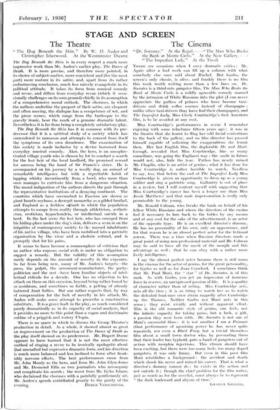STAGE AND SCREEN
The Theatre " The Dog Beneath the Skin." By W. H. Auden and Christopher Isherwood. At the Westminster Theatre The Dog Beneath the Skin is in every respect a much more impressive work than Mr. Auden's earlier play, The Dance of Death. It is more precise, and therefore more pointed, in its choice of subject-matter, more consistent and (for the most part) more mature in its satire, and, apart from its rather embarrassing conclusion, much less naively evangelistic in its political attitude. It takes its form from musical comedy and revue, and differs from everyday revue (which it occa- sionally challenges on its own ground) chiefly in its assumption of a comprehensive moral outlook. The choruses, in which the authors underline the purport of their satire, are eloquent and often moving, the dialogue has a competence of wit, and the prose scenes, which range from the burlesque to the gravely ironic, bear the mark of a genuine dramatic talent. Nevertheless it is far from being a completely satisfactory play.
The Dog Beneath the Skin has it in common with its pre- decessor that it is a satirical study of a society which has surrendered to unreason and attempts to conceal from itself the symptoms of its own decadence. The examination of this society is made inclusive kuy a device borrowed from everyday musical comedy. Alan, the hero, is an unsophis- ticated village youth who is. chosen by lot to conduct a search for the lost heir of the local landlord, the promised reward for success being the hand of Sir Francis's sister. He is accompanied on his journey by a woolly dog, an animal of remarkable intelligence but with a regrettable habit of lapping whisky incontinently from a bowl, who more than once manages to extricate- him from a dangerous situation. The moral indignation of the authors directs the pair through the representative institutions of a decaying continent. The countries which have succumbed to Fascism are shown as giant lunatic asylums, a decrepit monarchy as a gilded brothel, and England as a feckless suburb in which the population attempts to escape from reality through athleticism, testheti- eism, eroticism, hypochondria, or intellectual suicide in a herd. In the last scene the lost heir, who has emerged from his hiding-place under the dog's skin, delivers a seimm on the iniquities of contemporary society to tiv, massed inhabitants of his native village, who have been mobilised into a patriotic organisation by the vicar and a choleric colonel, and is vromptly shot for his pains.
It seems to have become a commonplace of criticism that an author- who exposes social evils is under no obligation to suggest a remedy. But the validity. of this assumption surely depends on the amount of novelty in the exposure. So far from being new, many of Mr. Auden's targets—the press, the pulpit, the armament-manufacturer, the party- politician and the rest—have been familiar objects of intel- lectual ridicule for a decade. One has no objection to his attack on them on this occasion, beyond being rather bored by so assiduous, and sometimes so feeble, a pelting of already battered Aunt Sallies. But one rather expects that, by way of comperMation for the lack of novelty in his attack, Mr. Auden will make some attempt to prescribe a constructive substitute. It is a grave fault in the play, as much considered inirely dramatically as in its capacity of social analysis, that it provides no more to this point than a vague and doctrinaire outline of a priggish and watery Utopia.
• There is no space in which to discuss the Group Theatre's production in detail. As a whole, it showed almost as great an improvement on the production of The Dance of Death as the 04y-itself showed on its predecessor. Mr. Rupert Doonc appears to have learned that it is not the most effective method of staging a revue to be ironically apologetic about that unexalted but expressive dramatic form, and his direction is much more balanced and-less inclined to force after freak- ishly nervous effects. The best , performances came from Mr. John Moody as the hero, and from Mr. John Glyn-Jones and Mr. Desmond Ellis as two journalists who accompany and complicate his search ; the worst from Mr. Gyles Isham, who declaimed the choruses with a painfully gentlemanly air. Mr. Auden's speech contributed greatly to the gaiety of the














































 Previous page
Previous page